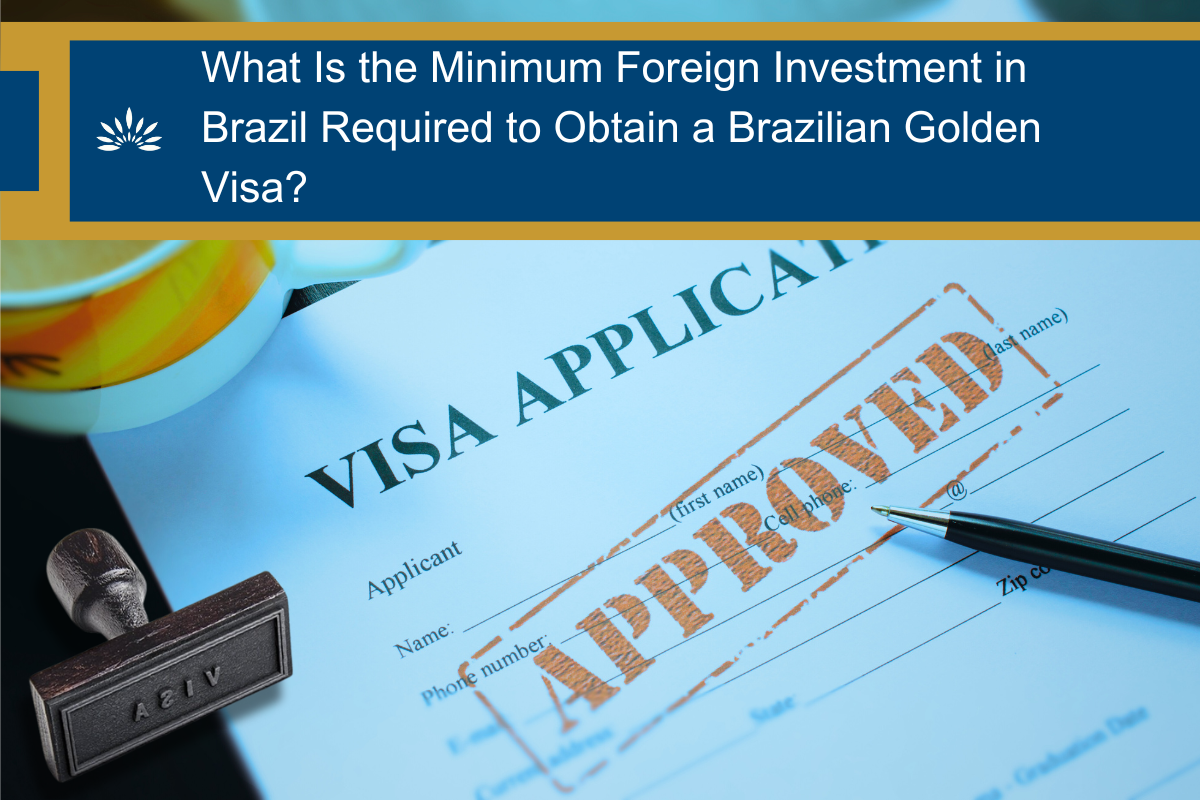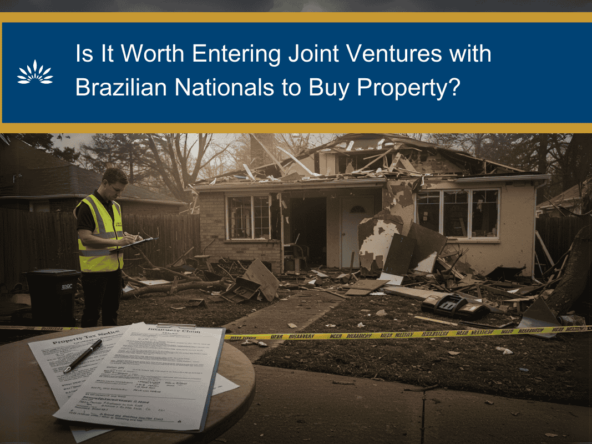Brazilian Golden Visa: Your Step-by-Step Investment Roadmap
Thinking about diving into Brazil’s booming real estate or business sector? This streamlined guide reveals the minimum requirements for a golden visa, helping you secure your future in this vibrant place.
Imagine two close friends sitting in a cozy café in the upscale Jardins neighborhood of São Paulo. They’re both from abroad, and you can see the excitement on their faces as they discuss how they could live in Brazil for the long term. One friend leans in, asking, “Have you heard about the brazilian visa that lets you stay if you make a certain foreign investment in brazil?” The other sips their coffee and responds, “Yes! I’m really interested in business investment here, especially in brazil real estate investment. I heard that if I invest correctly, I might even qualify for an investment visa or something called a brazil investor visa.” These conversations capture the growing global interest in Brazil, known for its vibrant culture, strong economy, and promising returns for smart investors.

If you’ve ever thought about making your life in Brazil—or simply dipping your toes into the local market—this guide will help you explore how to leverage foreign direct investment for a visa brazil. We’ll cover everything from the real estate laws you need to know, to the potential returns of real estate investments and how residency by investment programs might open a pathway to permanent residency or even citizenship. You’ll also discover the importance of partnering with a trustworthy real estate agent and a competent legal team to streamline your process.
Keep reading to find out how to navigate Brazil’s evolving market and seize the opportunities that come with investing in one of Latin America’s largest economies.
Understanding the Brazilian Golden Visa: A Brief Overview
What Is a Brazilian Golden Visa?
A brazil investor visa—often called a “golden visa”—allows non-residents to live and work in Brazil, provided they meet certain foreign investment in brazil requirements. While many countries around the world have residency by investment programs, Brazil stands out due to its diverse economic sectors, geographical appeal, and comparatively lower barriers to entry.
By attracting foreign direct investment, the Brazilian government boosts local businesses, job creation, and economic innovation. In exchange, investors who meet official criteria can enjoy simplified routes to residency and potential citizenship. Whether you choose to channel your funds into brazil real estate investment or an existing business, the end goal remains the same: secure a brazilian visa that opens the door to a fulfilling new life.
Why Is Foreign Investment in Brazil So Attractive?
Foreign investment in brazil offers a wealth of benefits. First, Brazil is the economic heavyweight of Latin America, boasting thriving agriculture, manufacturing, service, and tech sectors. Second, its cultural blend of modern urban centers and scenic natural landscapes appeals to a wide range of lifestyles. So whether you’re enticed by São Paulo’s bustling financial districts, Rio de Janeiro’s famous beaches, or more tranquil regions for agricultural ventures, you can find your niche.
Moreover, the Brazilian government frequently updates laws and regulations to stay competitive, enticing new investors to explore business investment in different sectors. This includes special considerations for innovators, such as reduced minimum capitals for investments that generate technology-based jobs. Combined with a youthful, increasingly educated workforce and an enormous consumer market, Brazil offers fertile ground for real estate investments, startups, and more.
The Importance of Real Estate Agent Support
When entering the brazil real estate investment realm, working closely with a reliable real estate agent can be a game-changer. A local professional understands the intricacies of real estate laws, regional market fluctuations, and cultural nuances that might not be apparent to first-time investors. They can help you identify prime neighborhoods, negotiate deals, and complete the extensive paperwork required.
A good agent also bridges the language gap, ensuring you’re aware of subtle details like property taxes, zoning rules, or association fees. By clarifying each step, they help mitigate unnecessary risks and confirm the purchase adheres to local regulations—so your road to a brazil investor visa is smoother.
Popular Routes to Obtain a Brazil Investor Visa
Direct Business Investment
One main avenue for acquiring an investment visa is direct business investment in Brazil. Typically, this involves starting a new venture or purchasing a stake in an existing one. To qualify, you’ll need to show a credible plan, back it up with funds, and demonstrate how your operations will positively impact the local economy—often through job creation or bringing unique know-how to the market.
Brazil has emerged as a hotspot for startups and established firms alike. São Paulo, for example, hosts a burgeoning tech scene, while agribusiness thrives in rural regions across the country. If you’re an entrepreneur or a company seeking expansion, diving into Brazilian markets can yield both profitable returns and a clearer path to a brazilian visa.
Brazil Real Estate Investment
Another highly favored approach is brazil real estate investment. From posh high-rise condos in São Paulo to beachside properties in Rio, the real estate sector can offer significant rental yields and property appreciation. Given the country’s constant population growth and urban development, demand for housing, commercial, and retail spaces often climbs steadily, making real estate investments a stable long-term bet.
Moreover, many residency by investment programs revolve around property ownership. By reaching a set threshold—an amount that can shift based on government policy or local economic conditions—you can apply for a visa brazil that grants residency privileges. Working with a real estate agent specialized in foreign direct investment properties helps you avoid unscrupulous deals while maximizing your potential ROI.
Investing in Startups or Innovation
For those who love the idea of fueling innovation, investing in startups focusing on tech, biotech, or renewable energy might be the ideal route. These sectors often receive special attention from the Brazilian authorities, which might lower the investment threshold for entrepreneurs who bring big ideas to local markets. Though riskier than some real estate investments, successful startups can expand rapidly, offering you not only residency but also a substantial financial windfall if the company takes off.
Government or Development Funds
Some countries worldwide offer golden visas through government bonds or state-managed funds, but Brazil typically emphasizes direct business investment or real estate. Nonetheless, keep an eye on any emerging policies that might broaden the range of permitted investments. It’s also wise to consult a reputable law office—like this one—for the most up-to-date information about any expansions in real estate laws or new funding options for a brazil investor visa.
Minimum Investment Amounts: What to Expect
Defining “Minimum Investment”
When people talk about “minimum investment” for a brazil investor visa, they usually mean the lowest amount of capital required by law or regulation to qualify for certain residency by investment programs. However, these numbers may fluctuate over time, so always verify current policies with an experienced lawyer or official government sources.
Historically Common Thresholds
A widely cited benchmark is around R$500,000 (roughly USD $100,000) for standard business investment—which could be higher or lower based on current exchange rates and regulatory changes. If you’re aiming at tech or innovation-driven sectors, the minimum can drop to around R$150,000 (approximately USD $30,000). For brazil real estate investment, the threshold sometimes hovers between R$700,000 and R$1 million, though these figures are not set in stone. Fluctuations in exchange rates and policy adjustments can alter what you ultimately need to invest.
Influence of Exchange Rates
Brazil’s currency can rise or fall against major world currencies, affecting how much you’ll have to move. By timing your currency transfers wisely and monitoring the exchange rate, you might be able to save or lose tens of thousands in equivalent local currency. This factor is particularly crucial when making large real estate investments or acquiring equipment for your new business in Brazil.
Navigating Real Estate Laws and Regulations
Real Estate Laws and Property Rights
Brazilian real estate laws generally favor foreign ownership, especially for urban properties. Typically, there’s no absolute ban on foreigners buying apartments or commercial spaces in major cities. Issues may arise, however, when it comes to rural lands or properties located near national borders—those areas sometimes have special restrictions.
Property registration is another essential step. In Brazil, property ownership is made official through registration with the local real estate registry office (Cartório de Registro de Imóveis). Unlike some countries where a title deed might suffice, you must ensure your name is officially recorded. This step is critical for establishing clear ownership rights and safeguarding your real estate investments.
Hiring a Real Estate Agent
A skilled real estate agent can be your ally in understanding local real estate laws. They’ll guide you through each step—identifying suitable listings, negotiating prices, and ensuring that every legal detail is handled correctly. This personalized support helps you dodge typical pitfalls like hidden debts tied to the property or sellers without legal authority to carry out the transaction.
Seeking Legal Counsel
While it’s not mandatory in every transaction, getting legal counsel from specialists in business investment or real estate laws is highly recommended. They can clarify local building codes, tax obligations, and the rules for foreign financing. Having a legal professional review your documents before finalizing any brazil real estate investment can provide invaluable peace of mind, especially if you’re pursuing a brazilian visa through property ownership.
Step-by-Step Guide to Obtaining an Investment Visa in Brazil
Step 1: Define Your Investment Goals
First, be clear on your motivations. Are you looking to become a full-time resident in Brazil, or do you simply want to diversify your portfolio? Pinpoint whether brazil real estate investment, a business investment, or a hybrid approach best fits your strategy. Also, think about which city or region aligns with your goals—metropolises like São Paulo and Rio have distinct pros and cons compared to smaller cities like Curitiba or Salvador.
Step 2: Consult Professionals
Next, assemble a team of experts. Start with a real estate agent for property-related ventures, or speak with corporate consultants for setting up a local business. Seek out an immigration lawyer who’s proficient in residency by investment programs. If your budget permits, consult tax accountants to navigate Brazil’s intricate tax codes. Partnering with the right professionals early on saves headaches and potentially speeds up your path to an investment visa or visa brazil.
Step 3: Prepare the Required Documentation
To be eligible for a Brazilian visa based on foreign direct investment, you’ll generally need the following:
- A Brazilian Tax ID (CPF – Cadastro de Pessoa Física): This serves as your individual taxpayer identification number in Brazil.
- Proof of Capital: Provide bank statements or similar documents demonstrating you have the necessary funds.
- Business Plan or Purchase Agreement: If you plan to buy property, a valid contract is essential. For business investments, a formal proposal outlining job creation or economic impact is required.
- Personal Identification: Include passport copies, a birth certificate, or comparable documents. These often need to be translated and notarized if issued outside Brazil.
Organize these files meticulously to avoid undue delays during the application process.
Step 4: Transfer Your Funds and Seal the Deal
Once your paperwork is in order, make the necessary financial moves—whether you’re buying real estate or investing in a local company in Brazil. Ensure your money transfer follows official channels so your capital inflows can be traced and legally recognized. If you decide on real estate investment in Brazil, finalize the purchase at the notary office, register your property, and keep all receipts to demonstrate legitimate foreign investment in Brazil. Maintaining clear documentation protects your ownership rights and highlights your compliance with Brazilian regulations regarding investment in Brazil.
Step 5: Submit Your Visa Application
With your investment complete, compile your documentation and apply for a brazil investor visa through the nearest Brazilian consulate or, if you’re already in Brazil, via the Ministry of Justice or Federal Police. Respond promptly to any additional information requests. Processing times can vary, so patience is key.
Step 6: Activate Your Residency and Enjoy Brazil
Upon approval, you’ll receive either a temporary or permanent residency permit. You’ll then be free to live in Brazil, possibly with the right to work depending on the visa’s conditions. Maintain your investment as required by the rules, and you could be on track to apply for permanent residency or even citizenship after a few years.
Real-Life Success Stories
Tech Startup in São Paulo:
One entrepreneur from North America decided to bring their online education platform to São Paulo. By setting up a local subsidiary and collaborating with Brazilian universities, they boosted local employment and tech skills. The entrepreneur’s business investment not only turned profitable but also led to quick approval for a brazil investor visa. Today, they expand across Latin America, operating comfortably out of a permanent office in Brazil.
Coastal Real Estate Venture in Rio:
Another investor fell in love with Rio de Janeiro’s famed beaches and purchased a townhouse near Ipanema. Renovating the property and listing it on short-term rental platforms led to consistently high occupancy rates. Over time, they leveraged steady income and growing property value to prove significant foreign investment in Brazil. This track record qualified them for an investment visa and eventually paved the way to permanent resident status, demonstrating how strategic investment in Brazil can lead to long-term benefits.
Agribusiness in the Northeast:
Finally, a European couple keen on sustainable farming identified fertile land in Brazil’s Northeast region. They introduced eco-friendly techniques and partnered with local farmers. Their project not only yielded strong returns but also spurred meaningful job creation in a less developed area. With documented proof of foreign direct investment, they successfully navigated the real estate laws for agricultural land, fulfilling the conditions for a brazilian visa tied to rural economic development.
Comparison Table: Main Avenues for a Brazil Investor Visa
| Investment Path | Approx. Minimum Investment | Key Advantages | Potential Drawbacks |
|---|---|---|---|
| Direct Business Investment | ~R$500,000+ (USD $100,000+) | – Direct control over your venture – Faster ROI potential | – Requires in-depth local market knowledge – Ongoing operational demands |
| Startup/Innovation | ~R$150,000+ (USD $30,000+) | – Lower threshold if tech-focused – Potentially high returns | – Higher risk (startups can fail) – Requires specialized expertise |
| Brazil Real Estate Investment | ~R$700,000+ (USD $140,000+) | – Tangible asset – Potential for rental income + property appreciation | – Maintenance and property taxes – Market fluctuations |
| Rural / Agribusiness | ~R$500,000+ (USD $100,000+) | – Access to booming agribusiness sector – High job creation potential | – Environmental/regulatory complexities – Seasonal/weather risks |
The Broader Brazil Business Environment
Brazil remains a global leader in agriculture and commodities, but it’s also innovating in technology, renewable energy, and advanced manufacturing. This diversity allows foreign investors to find unique niches aligned with their expertise. Whether you plan on building a software company or diving into real estate investments, the country’s varied economic landscape can accommodate a range of visions.
From the bustling urban atmosphere of São Paulo to the laid-back coastal vibes of Northeast cities, Brazil’s regions differ in culture, living costs, and business climates. Your success in foreign investment in brazil might hinge on matching your business model to the right location. For instance, agribusiness thrives in the central-west states, while tourism and hospitality flourish along the picturesque coastlines.
Brazilians value personal relationships. Business meetings often begin with small talk, and building trust can be crucial to closing deals. If you’re planning any brazil real estate investment, taking time to establish rapport with your real estate agent and local community members can lead to more favorable outcomes. Adaptability, patience, and an open-minded approach to cultural quirks will streamline your ventures.
Overcoming Common Pitfalls
Paperwork can be extensive, involving different government departments. By hiring a specialized lawyer who understands real estate laws or business investment regulations, you’ll tackle the red tape more efficiently.
Portuguese is the official language, and outside major business centers, English fluency can be limited. Investing in language lessons or hiring a bilingual consultant can prevent misunderstandings about contracts or official procedures.
Laws related to residency by investment programs, property ownership, and taxes can evolve over time. Stay informed through official Brazilian government channels and local legal advisors to adapt quickly and remain compliant.
Apart from property market swings, currency volatility can catch you off guard, significantly impacting your brazilian visa journey if you’re transferring large sums. Keep an eye on currency forecasts and consider working with a financial advisor for timing your remittances.
Benefits of Residency by Investment Programs
Once you secure residency under a brazil investor visa, you can often apply for permanent residency after a few years, provided you keep your investment intact. Eventually, you may become eligible for Brazilian citizenship, granting access to numerous global travel advantages and full participation in Brazil’s social, economic, and political life.
Having Brazilian residency simplifies tasks like opening local bank accounts, enrolling in public or private schools, and accessing Brazil’s healthcare system. If you plan on making Brazil your home base, these conveniences provide a substantial quality-of-life upgrade.
Including brazil real estate investment or a local business in your portfolio can hedge against economic fluctuations in your home country. Whether you plan to rent out your condo in Rio or operate a tech firm in São Paulo, your earnings might remain strong even if other global markets dip.
Brazil offers a colorful tapestry of festivals, rich regional cuisines, music, and dance traditions. Gaining residency allows you to fully immerse yourself, forging meaningful relationships and discovering aspects of the culture that go far beyond tourist experiences.
Deep Dive into Brazil Real Estate Investment
Cities like São Paulo, Rio de Janeiro, and Brasília host neighborhoods known for stability, infrastructure, and consistent demand. For instance, São Paulo’s Jardins or Vila Olímpia draw business professionals, while Rio’s Leblon or Ipanema cater to a higher-end crowd. Identifying neighborhoods with robust appreciation and rental potential can supercharge your real estate investments.
Short-term vacation rentals in tourist hotspots can yield excellent cash flow, especially in areas famous for carnival season or New Year’s festivities. Long-term rentals in business districts may provide steadier but slightly lower monthly returns. An experienced real estate agent will guide you on pricing, neighborhood expectations, and how to market your property effectively.
Brazilian banks sometimes offer mortgages to foreign buyers, though rates and terms may not be as favorable as they are for residents. Many foreign investors opt for cash purchases to speed up the process. Regardless, confirm your eligibility for financing as part of your brazil real estate investment plan, especially if you prefer to leverage your existing capital in other international markets.
Buying property in Brazil generally incurs a transfer tax (ITBI), and you must also factor in notary fees. Owners then pay annual property taxes, which vary by municipality. If you rent out your property, rental income is taxable, though certain deductions may apply. Staying compliant with local and possibly your home country’s tax laws ensures peace of mind and maximizes your net gains.
How Your Investment Evolves Over Time
Many who start with a temporary investment visa eventually progress to permanent residency. Adhering to the guidelines—such as maintaining the minimum capital or continuing your business investment—positions you to make Brazil your long-term home.
If you’ve opted for brazil real estate investment, your property’s value may appreciate over time. You could refinance or sell at a profit, funneling capital into a second property or broader real estate investments in commercial or industrial spaces.
For those who launch or invest in a local company, a successful track record can open doors to scaling nationwide. You might partner with Brazilian entrepreneurs, explore franchising opportunities, or expand to new markets beyond Brazil. This growth amplifies your returns and further solidifies your status in the country.
Many investors find personal satisfaction in creating jobs, supporting local businesses, or helping revitalize underdeveloped neighborhoods. In this way, a foreign investment in brazil not only benefits the investor but also leaves a lasting positive impact on communities.
Common Mistakes to Avoid
From ignoring local property taxes to failing to check a property’s title history, small oversights can lead to big losses. Thorough research and professional guidance minimize unpleasant surprises.
Sorting out a brazil investor visa, business permits, or property registration in a country with a different legal system can be daunting. Relying on a qualified lawyer and a dependable real estate agent can drastically reduce errors.
Excitement and potential gains might tempt you to move fast. But taking your time to assess location trends, double-check documentation, and confirm your investment strategy fosters success and protects your capital.
Formalities, personal interactions, and business etiquette can differ significantly from what you’re used to. Embrace cultural nuances and adapt your communication style to forge better relationships with Brazilian partners or local communities.
Additional Tips for a Smooth Transition
Attend business forums, conferences, and local meetups. By expanding your professional circle, you gain valuable insights and may uncover hidden investment gems in emerging neighborhoods or industries.
Speaking Portuguese, even at a beginner level, fosters trust and respect from locals. It also helps you handle simple day-to-day tasks like grocery shopping or reading utility bills.
Laws and regulations around residency by investment programs can shift with changing governments. Subscribe to official bulletins or consult your legal team every few months to stay compliant and spot new chances to invest.
If you have the capital, consider diversifying across multiple avenues: a brazil real estate investment in São Paulo plus a smaller business venture in another region, for example. Spreading your resources can mitigate risks.
What’s your biggest concern about investing in Brazil? Let us know in the comments!
For professional support, contact Camila Saunier International Realty to explore your real estate options or Oliveira Lawyers for legal assistance. Together, they’ll help make your Brazilian property dreams a reality.
Conclusion: Charting Your Path with Foreign Investment in Brazil
Brazil remains one of the most enticing destinations for foreign direct investment, offering a mix of economic potential and cultural richness. Whether you aim to own a beachfront condo in Rio, launch a tech startup in São Paulo, or purchase farmland in the countryside, the right business investment can open doors to a brazil investor visa—and a captivating life in this dynamic nation.
What’s your biggest challenge or curiosity about relocating or investing in Brazil? We’d love to know. Drop a comment or reach out for tailored guidance based on your unique circumstances.
If you’re ready to dive in, don’t hesitate to connect with trusted professionals—a knowledgeable real estate agent, an experienced attorney, or a financial advisor well-versed in residency by investment programs. Your future in Brazil could be bright, prosperous, and incredibly rewarding!
12 Frequently Asked Questions (FAQ)
1. What is the typical minimum required for a Brazil Investor Visa?
The amount varies but often lands around R$500,000 (approx. USD $100,000) for a business investment or foreign direct investment. In certain innovation or tech fields, the threshold may be as low as R$150,000 (approx. USD $30,000).
2. Can I obtain a Brazilian Visa by buying property?
Yes. Brazil real estate investment is one of the most common ways to secure a visa brazil under residency by investment programs. You typically need to invest a certain minimum amount to qualify.
3. Is it necessary to hire a Real Estate Agent when buying property?
While not legally mandatory, hiring a real estate agent can protect you from pitfalls and ensure compliance with local real estate laws. They can also help negotiate better deals and manage paperwork.
4. Do I need Portuguese to apply for an Investment Visa?
Proficiency in Portuguese is not always mandatory for the initial investment visa application. However, learning basic Portuguese can be beneficial for daily life, business negotiations, and cultural integration.
5. Is there a risk of losing my visa status if I sell my investment?
Typically, yes. If you sell your property or withdraw your business investment before meeting the required holding period, you might lose the eligibility for a brazil investor visa. It’s important to comply with the specified investment duration.
6. Are there any tax advantages for foreign investors?
Brazil does not offer universal tax breaks for foreign investors, but there may be sector-specific incentives. Always consult a tax specialist to understand your obligations and any local tax benefits.
7. How long does the visa application process take?
It varies based on the complexity of your documentation and how swiftly Brazilian authorities respond. Processing times can range from a few weeks to several months.
8. Can I include my family in my Investment Visa application?
In many residency by investment programs, you can include immediate family members like your spouse and children. Confirm with official sources or legal advisors for specific conditions.
9. Will I automatically qualify for Brazilian citizenship?
Investing in Brazil can lead to a brazilian visa and then permanent residency, but citizenship usually requires additional steps like language proficiency, a clean criminal record, and a certain period of continuous residence in the country.
10. What happens if the Real (Brazilian currency) fluctuates after I transfer funds?
Currency fluctuations can either reduce or increase the local value of your foreign transfer. Keep an eye on exchange rates and consider hedging strategies if your investment is especially large.
11. Where can I get legal advice about Real Estate Laws and Immigration?
You can reach out to specialized law firms in Brazil—such as this one—for guidance on real estate laws, business registration, and immigration protocols.
12. Which cities offer the best Real Estate Investments?
This largely depends on your investment goals. São Paulo is known for commercial and upscale condos, Rio for tourism-friendly rentals, and Brasília for proximity to government institutions. Each region has its own advantages, so research carefully or talk to a real estate agent with local expertise.





